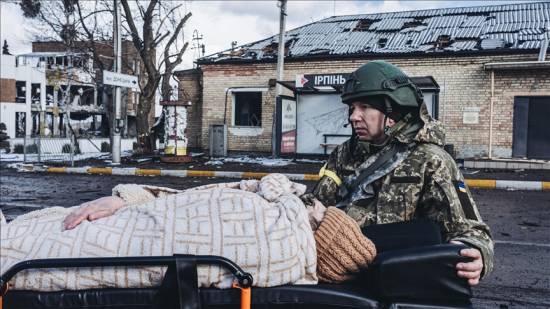The continuing war between Russia and Ukraine will bring dire health consequences, including the spread of COVID-19, impacting millions of people, the Red Cross warned on Thursday.
The concerns of diseases are spreading as fighting in Ukraine has been continuing for two weeks, leaving no one “unscathed,” said the International Federation of Red Cross and Red Crescent Societies (IFRC).
"As the lives of millions are being upended, there is a real concern of diseases spreading, pre-existing health conditions worsening and mental health concerns increasing," said the Red Cross.
The warning added to concerns expressed the day before in Geneva by the World Health Organization (WHO).
An estimated 18 million people – a third of the country's population – will need humanitarian assistance, and more than 2.3 million people have fled to neighboring countries, said the IFRC.
"Many of the people affected were already vulnerable before the conflict," said Birgitte Bischoff Ebbesen, IFRC regional director for Europe, adding that now they “face an even harsher situation as they are losing their homes and their livelihoods, being forced to seek shelter wherever they can or fleeing their country in search of safety.”
Bischoff said they urgently need food, water, and shelter, "but also emergency medical care, protective measures, and psychosocial support to avert an even greater humanitarian catastrophe."
People fleeing conflict often experience highly distressing situations, loss, and trauma, impacting their mental health and coping ability, said the IFRC.
Psychosocial support
"Psychosocial support will be needed in the days, weeks, and months to come," IFRC said.
On Wednesday, Mike Ryan, head of WHO's global emergencies, warned: "Conflict and infectious diseases are intimately intertwined."
He said that many older persons with complex health needs may not be able to move or cannot move quickly to flee the fighting, adding: "Getting aid and assistance to them is very important."
There are around 1,000 health facilities of different sizes, not all hospitals, but clinics, polyclinics, and various healthcare delivery entities, either on the frontlines or within 10 kilometers (six miles) of the frontline.
"So, in effect, the health system is becoming engulfed in this conflict," said Ryan.
He said that the authorities are abandoning some hospitals because they cannot function.
Ryan said all the hospitals need power, clean water, engineers, and fuel supply for generators.
"All of this support is needed to keep your average hospital going in a normal situation - in the middle of a shooting war - it's almost impossible," he said. WHO will do what it can to support health workers in "their heroic efforts."
"But this crisis from a health perspective can only get worse unless there's an immediate move to cease hostilities within Ukraine and to stop this war," said Ryan./aa


